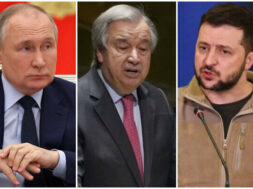
Global crisis: “World is in great peril”, UN chief Guterres warns
Virendra Pandit
New Delhi: Expressing deep concern over the problems facing the world since the outbreak of Covid-19 in early 2020, United Nations Secretary-General Antonio Guterres has warned leaders that the world is in “great peril.”
He made these remarks ahead of the world leaders’ meeting for the General Debate at the United Nations General Assembly (UNGA) on Tuesday in person for the first time in three years. They must tackle conflicts and climate catastrophes, increasing poverty and inequality, and address divisions among major powers that have gotten worse since Russia invaded Ukraine, he said.
Guterres said the “immense” task is not only of saving the planet, “which is literally on fire,” but of dealing with the persisting pandemic. He also pointed to “a lack of access to finance for developing countries for a post-pandemic recovery, a crisis not seen in a generation” that has seen ground lost for education, health, and women’s rights.
Guterres will deliver his “State of the World” speech at Tuesday’s opening of the annual high-level global gathering. UN spokesperson Stephane Dujarric said it would be “a sober, substantive, and solutions-focused report card” for a world “where geopolitical divides are putting all of us at risk.”
“There will be no sugar-coating in his remarks, but he will outline reasons for hope,” Dujarric told reporters Monday.
The 77th General Assembly meeting of world leaders convenes under the shadow of Europe’s first major war since World War II, i.e., the conflict between Russia and Ukraine, which has unleashed a global food crisis and opened fissures among major powers in a way not seen since the Cold War.
Nearly 150 heads of state and government are expected to address the UNGA meeting, a sign that despite the fragmented state of the planet, the UN remains the key gathering place for presidents, prime ministers, monarchs, and ministers to not only deliver their views but to meet privately to discuss the challenges on the global agenda—and, maybe, make some progress, the media reported on Tuesday.
Among the top issues facing the UN is the Russian invasion of Ukraine on February 24, which not only threatens the sovereignty of its smaller neighbor but has raised fears of a nuclear catastrophe at Europe’s largest nuclear plant in the country’s now Russia-occupied southeast.
Many world leaders are trying to prevent its fallout into a wider war and restore peace in Europe. But few expect any breakthroughs immediately.
They relate the second issue to the first. Losing grain and fertilizer exports from Ukraine and Russia has triggered a food crisis, especially in developing countries, inflation, and a rising cost of living in many others.
The media reported that at a meeting on Monday to promote the UN’s goals for 2030 — including ending extreme poverty, ensuring quality education for all children, and achieving gender equality — Guterres said the world’s many pressing perils make it “tempting to put our long-term development priorities to one side.”
But he said some things can’t wait — among them education, dignified jobs, full equality for women and girls, comprehensive health care, and action to tackle the climate crisis. He called for public and private finance and investment, and, above all, for peace.
The UNGA’s Tuesday meeting, known as the General Debate, was entirely virtual in 2020 because of the pandemic, and hybrid in 2021. This year, the 193-member General Assembly is returning to only in-person speeches, with a single exception — Ukrainian President Volodymyr Zelensky.
Over objections from Russia and a few allies, the UNGA voted last Friday to allow the Ukrainian leader to prerecord his speech because of reasons beyond his control — the “ongoing foreign invasion” and military hostilities that require him to carry out his “national defense and security duties.”
By tradition, Brazil has spoken first for over seven decades because, at the early General Assembly sessions, it volunteered to start when no other country did.
The US President, representing the host country for the United Nations, is traditionally the second speaker. But President Joe Biden’s speech has been pushed to Wednesday to enable him to return from London after the Queen’s funeral.













